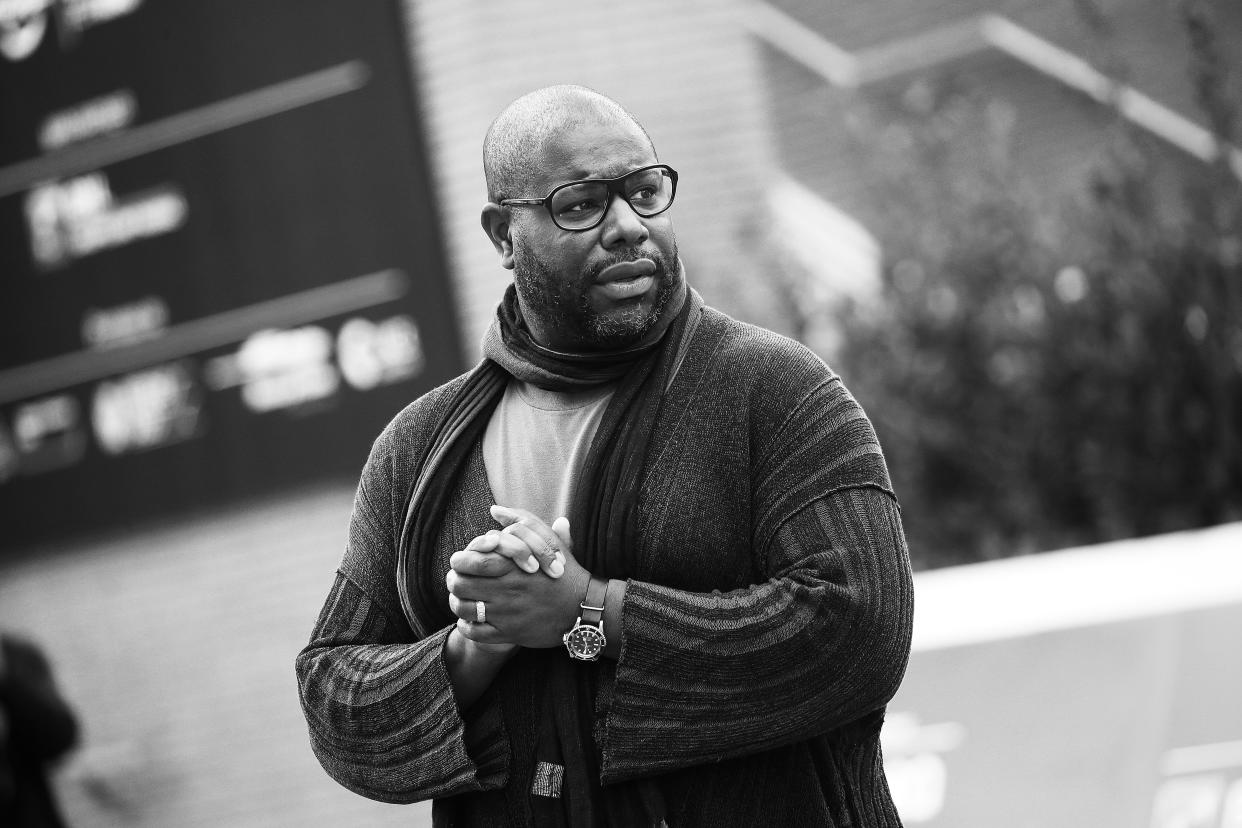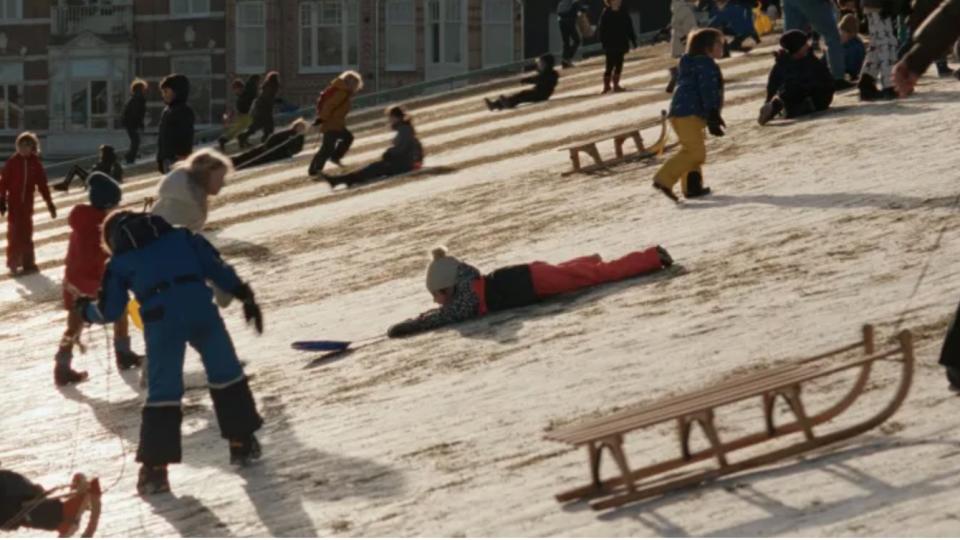Steve McQueen Justifies His 4.5-Hour Documentary on the History of Nazi-Occupied Amsterdam

Steve McQueen’s “Occupied City,” an experimental documentary about Amsterdam under Nazi rule, clocks in at a menacing four-and-a-half hours with one intermission — but the filmmaker makes no apologies for its heft. “It wasn’t a case of wanting to do something long,” he said over Zoom from his home in the same city where the movie takes place. “It was a case of wanting to do something right.”
It could have run much longer: McQueen shot 36 hours worth of material, nine times more than the final cut. The movie, which premieres at Cannes this week, pairs footage of modern-day Amsterdam with dry narration by performance artist Melanie Hyams about the Nazi persecution of the Jews that took place. The voiceover culls from the book “Atlas of an Occupied City (Amsterdam 1940-1945),” by his wife, Dutch journalist and documentarian Bianca Stigter. “It needed to be a journey so you get to know the city,” McQueen said. “The subject has to fit the form.”
More from IndieWire
'The Goldman Case' Review: Cédric Kahn Weaves a Fascinating, True-Life Courtroom Drama
As Johnny Depp Takes Cannes, Hollywood Says It's Ready for His Comeback
Stigter’s first cinematic investigation of the Holocaust was the 2021 “Three Minutes: A Lengthening,” a feature built around three minutes of footage rescued from a Polish Jewish community later decimated by the Nazis. “Occupied City” takes the opposite approach, eschewing even a single frame of archival material in favor of contemporary moments throughout the city.
The resulting juxtaposition of everyday life with the descriptions of Jewish bans, executions, and hideaways results in a challenging but precise meditation on how mundane routine erases the residue of historical trauma. “As much as it is about the past, this film is extremely about the present,” McQueen said. “Unfortunately, we never seem to learn from the past. Things sort of overtake us.” In that regard, he sees the movie as a wake-up call.
“With the rise of the far right being very vocal and given an actual platform, it’s being legitimized,” McQueen said. “I think when you get the images of what’s happening now and the actual stories of the past and put them together, it makes us question everything.”
“Occupied City” is not a conventional exploration of WWII-era Amsterdam and demands a different level of engagement. The project is more like McQueen’s gallery and installation work than his traditional narrative features. Thematically, it makes sense from the director of “12 Years a Slave” — but the cinematic conceit has more in common with “Static 2009,” his digital projection of the Statue of Liberty, or last year’s “Grenfell,” a visual salute to the Grenfell Tower in West London destroyed in a deadly fire earlier that day. McQueen initially intended “Occupied City” to be a part of his visual art repertoire that present the deceptive simplicity of geographic locations while forcing audiences to consider the more advanced meanings they accrue with time.

“At first, I had this idea for an artwork that would project the present onto the past,” McQueen said. “My wife was writing this book and while talking to her, I thought it would be great to film the book. I didn’t think in a million years that my wife and I would collaborate, but somehow this emerged.”
The voiceover draws out detailed histories as the footage reveals the hidden nature of Nazi history across the city. There’s the square outside the famed Rijskmuseum where Jews defied a ban on organized assembly; inside the museum are recollections of Nazi-certified art exhibits. Suburban homes hid Jews from Nazis. Parks filled with teens were once strewn with corpses. “Occupied City” careens through these locations with a degree of remove that forces viewers to consider the implications of the memories buried by time. The score is sparse.
It’s a far cry from the typical Holocaust tearjerker, and McQueen doesn’t waste time lingering in the Anne Frank house. “For me, there was no space for sentimentality,” he said. “The text, and the delivery of the text, is very formal — but it’s not supposed to be dispassionate. It’s informational. The emotion comes from the viewer.”
In one of the most jarring contrasts, the movie visits a high school (one that the couple’s daughter used to attend) that served as an SS headquarters. “People were interrogated where kids now have their lockers and park their bikes,” McQueen said. “The spaces are all still here.”
McQueen knows that it can be difficult to process dense historical record in tandem with footage from a different era. The British-born filmmaker said he was amazed to discover Nazi history in Amsterdam when he first moved there and intended the cognitive dissonance to convey his own experience. “Sometimes the images take over from the information or the information overtakes the images, like you can’t think of them together,” he said. “It allows you to go somewhere else in your thoughts, but then it shakes you into the present.”
With support from A24 and New Regency, McQueen gathered footage for “Occupied City” over three years. “In the time that we filmed, you had George Floyd, Ukraine, the global warming crisis, COVID, the storming of the Capital building,” he said. “It just felt like the whole world was happening in those three years.”
The pandemic coinciding with the rise of extremism struck him as an especially potent convergence. “Occupied City” opens with footage of empty streets and the occasional masked pedestrian, cementing the contemporary focus early on. “With COVID, there was this sense of everyone going through it together,” McQueen said. “That was true in the Second World War as well. Everyone was affected by it.”
By sampling snippets of anti-vaccine propaganda, McQueen said, he wasn’t sympathizing with the sentiment. Instead, he wanted to call attention to the recurring ability for disinformation to creep into society in its most tumultuous moments. “The whole idea that the Nazis called themselves a working class or social Democratic Party tells you a lot about the sort of bending of the right to the extremes of the left,” he said. “Imagine five or 10 years ago writing a script about people in a pandemic wanting to stay and open their shops rather than running to the hills. No one would’ve believed it.”
McQueen’s next work is more traditional. Five years after his studio-produced heist thriller “Widows,” McQueen is in post-production with Apple’s “Blitz,” a WWII saga starring Saoirse Ronan. “I’m fortunate enough that I want to do other things,” McQueen said. “You hope that what you do appeals to audiences because that’s the chance you get to make movies at a certain scale. That’s the game.”
“Occupied City” will premiere at the 2023 Cannes Film Festival. A24 and New Regency will distribute it at a later date.
Best of IndieWire
Where to Watch This Week's New Movies, from 'The Starling Girl' to 'BlackBerry'
Every Palme d'Or Winner from the Cannes Film Festival, Ranked
Sign up for Indiewire's Newsletter. For the latest news, follow us on Facebook, Twitter, and Instagram.

